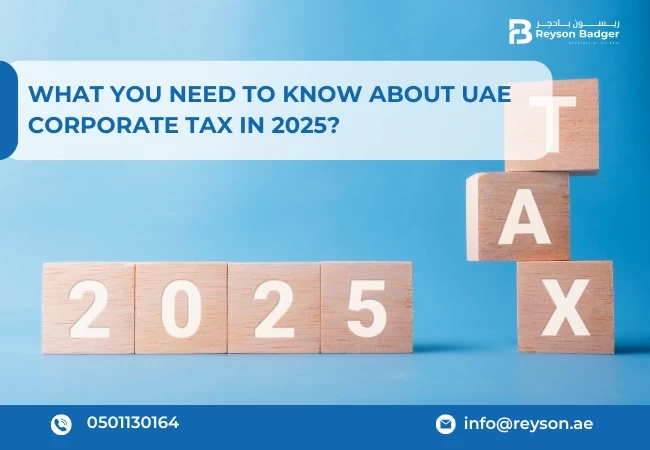What You Need to Know About UAE Corporate Tax in 2025?
Written By Akshaya Ashok, Reviewed By Reyees K P
Published on 28/04/2025

The UAE has always been a hub for global business, and with the introduction of corporate tax, things are evolving. Whether you're a seasoned business owner here, a fresh startup founder, or an international company considering setting up a company in the Emirates, understanding the corporate tax landscape is now crucial.
This blog aims to provide a comprehensive yet accessible overview of the essential facts surrounding UAE Corporate Tax in 2025, addressing the specific needs of UAE-based businesses, from established enterprises to burgeoning startups, as well as international companies considering or operating within the Emirates.
Who is Subject to Corporate Tax?
Generally, corporate tax applies to most companies and other legal entities registered in the UAE. This includes:
- UAE mainland companies: Whether they are Limited Liability Companies (LLCs), Public Joint Stock Companies (PJSCs), etc.
- Free zone companies: Hold on, this is where it gets interesting! Qualifying free zone entities can still benefit from 0% corporate tax on their qualifying income. We'll touch more on this in a bit.
- Foreign companies with a permanent establishment in the UAE: If your international business has a fixed place of business in the UAE through which it conducts its activities, you'll likely be subject to corporate tax on the profits attributable to that establishment.
Exemptions to Keep in Mind:
Not everyone is subject to corporate tax. Some key exemptions include:
- Natural persons: Individuals are generally not subject to corporate tax on their salaries, personal investments, or other personal income.
- Government entities: Federal and Emirate government entities, as well as wholly government-owned companies, are typically exempt.
- Qualifying public benefit entities: Certain non-profit organizations that serve a public benefit may be exempt.
The Basics: What is UAE Corporate Tax?
Simply put, corporate tax is a levy on the taxable profits of companies and other legal entities. The UAE implemented this tax, effective from financial years starting on or after June 1, 2023. So, for many businesses, the first tax returns will be due in 2025. It's a significant step towards aligning the UAE with global tax standards.
The Rates You Need to Know:
This is probably the most important bit! The standard corporate tax rate in the UAE is:
- 0% for taxable profits up to AED 375,000. This is fantastic news for startups and small businesses!
- 9% for taxable profits exceeding AED 375,000. This rate is still competitive on a global scale.
Think of it as a two-tiered system designed to support smaller players while ensuring larger, profitable entities contribute fairly.
What are the Latest Updates for UAE Corporate Tax 2025?
- The UAE Joins the Global Tax Fairway: The UAE has taken a significant step by adopting the OECD's Global Anti-Base Erosion (GloBE) Rules, also known as Pillar Two, through Ministerial Decision No. (88) of 2025. Essentially, this means that large multinational enterprises (MNEs) operating in the UAE with substantial global revenues (exceeding EUR 750 million) will be subject to a minimum corporate tax rate of 15%. This move brings the UAE in line with international efforts to prevent tax avoidance and ensures a level playing field for taxation globally.
- Good News for Fund Investors: There's good news for investors in the UAE! Starting from the financial year 2025, income derived from Qualifying Investment Funds (QIFs) will generally be exempt from corporate tax. However, this exemption comes with a couple of important conditions. Firstly, there needs to be a 'diversity of ownership,' meaning no single investor or related parties should own 30% or more (some reports indicate 50% or control). Secondly, the fund's investment in immovable property (real estate) should not exceed 10% of its total asset value. If these conditions aren't met, non-resident juridical investors might still have a taxable presence (nexus) in the UAE.
- Clarity for Free Zone Distribution Businesses: Businesses operating in the UAE's designated free zones that are primarily involved in distribution activities can expect updated guidance regarding corporate tax. The Ministry of Finance is set to issue clarifications on how these businesses can continue to benefit from a 0% corporate tax rate on their qualifying income. This upcoming guidance will likely outline the specific requirements and procedures these companies need to follow, potentially including the need for audited financial statements to demonstrate their qualifying status. To maintain the 0% rate, free zone entities will need to ensure they are generating qualifying income and have an adequate level of substance within the UAE.
- Clearer Tax Rules for Foreign Investors in UAE Funds and Properties: Foreign companies (non-resident juridical persons) that receive income from Qualifying Investment Funds (QIFs) or Real Estate Investment Trusts (REITs) in the UAE will generally not be subject to corporate tax in the Emirates. This is unless they establish a taxable presence or nexus within the UAE. Cabinet Decisions 35 and 34 of 2025 aim to provide this clarity and reduce potential unintended tax liabilities and compliance burdens for these international investors. However, a taxable nexus could still arise if certain conditions related to income distribution or ownership are not met.
- Introducing a Minimum Tax for Large Global Companies: Starting in 2025, the UAE will implement a Domestic Minimum Top-Up Tax (DMTT) with a rate of 15%. This tax will apply to large multinational enterprises (MNEs) that have a total consolidated global revenue of EUR 750 million or more. This is a direct implementation of the OECD's Pillar Two framework and ensures that these significant global players pay a minimum level of tax on their profits, regardless of where those profits are generated.
- Potential Tax Advantages for Hiring Skilled Professionals and Investing in Innovation: The UAE is introducing incentives to attract top talent and encourage research and development. Effective from 2025, companies that hire highly skilled professionals in key sectors like technology, finance, R&D, and healthcare may be eligible for a refundable tax credit. Furthermore, businesses investing in research and development (R&D) activities can anticipate potential expenditure-based tax credits ranging from 30% to 50%, expected to come into effect from 2026. These measures aim to boost the UAE's knowledge-based economy.
- Important Dates and Compliance Requirements You Need to Know: Staying on top of deadlines is crucial. For financial years ending on December 31, 2024, the corporate tax filing deadline is September 30, 2025. Additionally, natural persons (individuals) conducting business activities with an annual turnover exceeding AED 1 million must register for corporate tax by March 31, 2025. Beyond these dates, all businesses must maintain accurate and comprehensive financial records and ensure that any transactions with related parties are conducted at arm's length, meaning they should be priced as if they were between independent entities.
- Navigating Corporate Tax in UAE Free Zones: Companies operating within UAE free zones need to be particularly aware of the specific rules to qualify for the 0% corporate tax rate. This generally involves generating "qualifying income" (which will be further defined in upcoming guidance) and demonstrating that they have an adequate level of economic substance within the free zone. This means they need to conduct core income-generating activities within the zone and be appropriately managed and directed from there.
- Understanding Tax Transparency for Partnerships: Certain types of partnerships in the UAE may be treated as tax-transparent entities. This means that the partnership itself is not taxed; instead, the individual partners are taxed on their share of the partnership's income. This treatment is typically conditional on all partners agreeing to this transparent approach and the partnership not possessing a separate legal personality from its partners.
How Can You Prepare Your Business for UAE Corporate Tax in 2025?
- Assess your business structure: Understand how the corporate tax rules apply to your specific entity type and activities.
- Review your accounting and record-keeping: Ensure your financial records are accurate and can support the calculation of taxable profits.
- Understand the concept of "taxable profit": This isn't necessarily the same as your accounting profit. There will be rules around allowable deductions and adjustments.
- Stay updated on regulations and guidance: The Federal Tax Authority (FTA) will continue to issue clarifications and guidelines. Make sure you're following their updates.
- Consider seeking professional advice: Tax laws can be complex. Consulting with tax advisors can help you navigate the rules and ensure compliance.
Conclusion
The introduction of corporate tax in the UAE is a significant development, but it's designed to be fair and competitive. By understanding the key facts – the rates, who it applies to, the exemptions, and the specifics for free zones – you can ensure your business is well-prepared for corporate tax in 2025 and beyond. Stay informed, get your house in order, and don't hesitate to seek expert advice and services from Reyson Badger. We provide the following Services for corporate tax:
Choose Reyson Badger for your business success!

Written By
Akshaya Ashok
Akshaya Ashok is a content writer specializing in creating content focused on accounting and auditing. With over two years of experience, she has developed expertise in crafting professional content for the financial sector.

